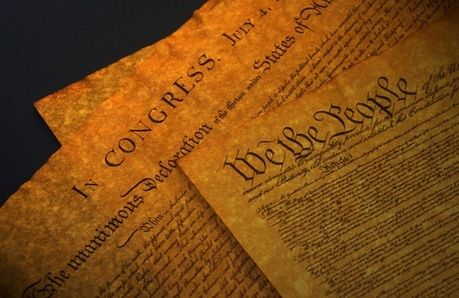'Infrastructure' Bill -- Does Anyone Still Believe in the Constitution?

By Larry Elder
It's no surprise that Democrats want an "infrastructure" bill. The depressing part is that the supposedly limited government/federalist Republicans are prepared to comply.
Sure, Republicans complain about the price tag, arguing that it's too big, too inflationary. But as to the proposition that it's the federal government's role to build/repair/expand the "infrastructure" of states, there is little or no quarrel from Republicans.
During former President Donald Trump's administration, Republicans wanted to make similar "investments" in states' roads, bridges, waterways, etc., insisting businessman Trump would ensure a more efficient, productive use of the spending.
Sen. Rob Portman, R-Ohio, voted for President Joe Biden's $1.2 trillion "infrastructure" bill, saying: "Every president ... has tried to get the infrastructure bill done. One of those presidents is our most recent president, President Donald Trump, who pushed to pass a $1.5 trillion infrastructure bill during his time in office, in his budget."
No, not every president. Some early presidents actually followed the U.S. Constitution and insisted things like a crumbling bridge in state A is not the responsibility of taxpayers in states B through Z.
Yes, the investment-infrastructure train left the station many years ago, but it's instructive to see how far we've gone down the tax-and-spend road while ignoring the constitutional principle that presidents once subscribed to. Objecting to a congressional bill to give money to French refugees, James Madison -- known as the "Father of the Constitution," and our fourth president -- wrote, "I cannot undertake to lay my finger on that article of the Constitution which granted a right to Congress of expending, on objects of benevolence, the money of their constituents."
During the presidency of James Monroe, America's fifth president, Congress proposed a "build back better" bill to expand the Cumberland Road. Even though the expansion would go through and benefit his home state of Virginia, Monroe cast his only veto against the bill. According to Monroe's biography on the University of Virginia's americanpresident.org: "Although Monroe personally supported the idea of internal improvements, he balked at the federal government's role in ... a series of federally financed projects designed to improve and update the nation's roads, bridges and canals. Monroe worried ... that federal payments for such internal improvements would expand even further the power of the federal government at the sake of state power. Where would the limits be drawn?"
Today, few in Congress question whether government should spend money on infrastructure, focusing only on how much to spend.
The constitutional principle is not the only reason that "infrastructure" bills are bad. Why should a state said aside money to fix its own bridges when the state knows that it can spend its money on other priorities, given that sooner or later the federal government, aka all taxpayers, will ride to the rescue? After President Jimmy Carter signed 1979's Federal Emergency Management Act, FEMA began giving money to states experiencing "natural disasters." The number of declared natural disasters skyrocketed. States spent their money on other things knowing that declaring a "natural disaster" would provoke an influx of federal dollars.
After Biden's infrastructure bill, he wants Congress to "invest" in his Build Back Better bill. White House press secretary Jen Psaki recently said, "He's going to deliver for all Americans, as is evidenced by the infrastructure bill ... that's going to help expand broadband to everyone, no matter your political party."
"Expand broadband," which means internet access? The Heritage Foundation, a conservative think tank, wrote: "The Biden Administration is less interested in bridging the digital divide than it is about transforming the United States' successful intermodal competitive system into a utility provided by local governments. Federal intervention ... only serves to distort competition, enriching incumbents and hindering the development of new technology. ... The best way to lower prices is not with heavy-handed price controls and cumbersome regulation but through robust competition."
I have written that half the country believes in a free lunch and the other half is stopping them from eating it. When it comes to Democratic and Republican support for federal government "infrastructure" spending and "investments," it is sometimes hard to know which half is which.
[Larry Elder is a bestselling author and nationally syndicated radio talk show host. His latest book, "The New Trump Standard," is available in paperback from Amazon.com and for Nook, Kindle, iBooks and Google Play. To find out more about Larry Elder, or become an "Elderado," visit www.LarryElder.com. Follow Larry on Twitter @LarryElder. To read features by other Creators Syndicate writers and cartoonists, visit the Creators Syndicate website at www.creators.com.]
COPYRIGHT 2021 LAURENCE A. ELDER
DISTRIBUTED BY CREATORS.COM
It's no surprise that Democrats want an "infrastructure" bill. The depressing part is that the supposedly limited government/federalist Republicans are prepared to comply.
Sure, Republicans complain about the price tag, arguing that it's too big, too inflationary. But as to the proposition that it's the federal government's role to build/repair/expand the "infrastructure" of states, there is little or no quarrel from Republicans.
During former President Donald Trump's administration, Republicans wanted to make similar "investments" in states' roads, bridges, waterways, etc., insisting businessman Trump would ensure a more efficient, productive use of the spending.
Sen. Rob Portman, R-Ohio, voted for President Joe Biden's $1.2 trillion "infrastructure" bill, saying: "Every president ... has tried to get the infrastructure bill done. One of those presidents is our most recent president, President Donald Trump, who pushed to pass a $1.5 trillion infrastructure bill during his time in office, in his budget."
No, not every president. Some early presidents actually followed the U.S. Constitution and insisted things like a crumbling bridge in state A is not the responsibility of taxpayers in states B through Z.
Yes, the investment-infrastructure train left the station many years ago, but it's instructive to see how far we've gone down the tax-and-spend road while ignoring the constitutional principle that presidents once subscribed to. Objecting to a congressional bill to give money to French refugees, James Madison -- known as the "Father of the Constitution," and our fourth president -- wrote, "I cannot undertake to lay my finger on that article of the Constitution which granted a right to Congress of expending, on objects of benevolence, the money of their constituents."
During the presidency of James Monroe, America's fifth president, Congress proposed a "build back better" bill to expand the Cumberland Road. Even though the expansion would go through and benefit his home state of Virginia, Monroe cast his only veto against the bill. According to Monroe's biography on the University of Virginia's americanpresident.org: "Although Monroe personally supported the idea of internal improvements, he balked at the federal government's role in ... a series of federally financed projects designed to improve and update the nation's roads, bridges and canals. Monroe worried ... that federal payments for such internal improvements would expand even further the power of the federal government at the sake of state power. Where would the limits be drawn?"
Today, few in Congress question whether government should spend money on infrastructure, focusing only on how much to spend.
The constitutional principle is not the only reason that "infrastructure" bills are bad. Why should a state said aside money to fix its own bridges when the state knows that it can spend its money on other priorities, given that sooner or later the federal government, aka all taxpayers, will ride to the rescue? After President Jimmy Carter signed 1979's Federal Emergency Management Act, FEMA began giving money to states experiencing "natural disasters." The number of declared natural disasters skyrocketed. States spent their money on other things knowing that declaring a "natural disaster" would provoke an influx of federal dollars.
After Biden's infrastructure bill, he wants Congress to "invest" in his Build Back Better bill. White House press secretary Jen Psaki recently said, "He's going to deliver for all Americans, as is evidenced by the infrastructure bill ... that's going to help expand broadband to everyone, no matter your political party."
"Expand broadband," which means internet access? The Heritage Foundation, a conservative think tank, wrote: "The Biden Administration is less interested in bridging the digital divide than it is about transforming the United States' successful intermodal competitive system into a utility provided by local governments. Federal intervention ... only serves to distort competition, enriching incumbents and hindering the development of new technology. ... The best way to lower prices is not with heavy-handed price controls and cumbersome regulation but through robust competition."
I have written that half the country believes in a free lunch and the other half is stopping them from eating it. When it comes to Democratic and Republican support for federal government "infrastructure" spending and "investments," it is sometimes hard to know which half is which.
[Larry Elder is a bestselling author and nationally syndicated radio talk show host. His latest book, "The New Trump Standard," is available in paperback from Amazon.com and for Nook, Kindle, iBooks and Google Play. To find out more about Larry Elder, or become an "Elderado," visit www.LarryElder.com. Follow Larry on Twitter @LarryElder. To read features by other Creators Syndicate writers and cartoonists, visit the Creators Syndicate website at www.creators.com.]
COPYRIGHT 2021 LAURENCE A. ELDER
DISTRIBUTED BY CREATORS.COM
Recent
The Heart of the Matter Is the Matter of the Heart
February 14th, 2026
People of Color can also steal…Duh?
February 14th, 2026
The Monroe Doctrine Isn’t Outdated — It’s Vital for American Security
January 5th, 2026
Defining Racism “UP”
January 4th, 2026
The Voting Rights Act Should Protect Voting—Not Perpetuate Fear
January 4th, 2026
Archive
2026
2025
February
March
July
September
October
November
2024
January
Cartoon 01/01/24Cartoon 01/02/24Claudine Gay Betrayed the American Values of My Black Elders to Exploit White GuiltCartoon 01/03/24Cartoon 01/05/24Cartoon 01/06/24Cartoon 01/07/24Cartoon 01/08/24We need a David, not a SaulCartoon 01/13/24Cartoon 01/09/24Cartoon 01/10/24Cartoon 01/11/24Cartoon 01/14/24Cartoon 01/12/24What Happens to a King Deferred? A ReduxCartoon 01/15/24Cartoon 01/16/24The Good Guys with Guns Part 1Cartoon 01/17/24America Works. DEI Doesn’t.Cartoon 01/18/24Cartoon 01/23/24Good Guys with Guns Part 2Cartoon 01/19/24Cartoon 01/21/24Cartoon 01/22/24Cartoon 01/24/24Cartoon 01/26/24Cartoon 01/25/24Cartoon 01/27/24
February
Cartoon 02/04/24Cartoon 02/03/24Cartoon 02/02/24Cartoon 02/01/24Cartoon 01/31/24Cartoon 01/28/24Cartoon 01/29/24We’ve Been Gay(ed) Part 1Cartoon 02/05/24Cartoon 02/06/24Cartoon 02/07/24Cartoon 02/08/24Cartoon 02/13/24Cartoon 02/12/24Cartoon 02/09/24Cartoon 02/11/24Cartoon 02/10/24Cartoon 02/19/24'Black America at Crossroads’ of Culture Wars as Presidential Election LoomsWe’ve Been Gay(ed) Part 2Cartoon 02/18/24Cartoon 02/17/24Cartoon 02/16/24Cartoon 02/15/24Cartoon 02/14/24Cartoon 02/22/24Cartoon 02/21/24Cartoon 02/20/24America Needs a “Black Wives Matter” Movement To Rebuild the Black FamilyCartoon 02/23/24Cartoon 02/24/24Cartoon 02/25/24Cartoon 02/26/24Cartoon 02/27/24

No Comments